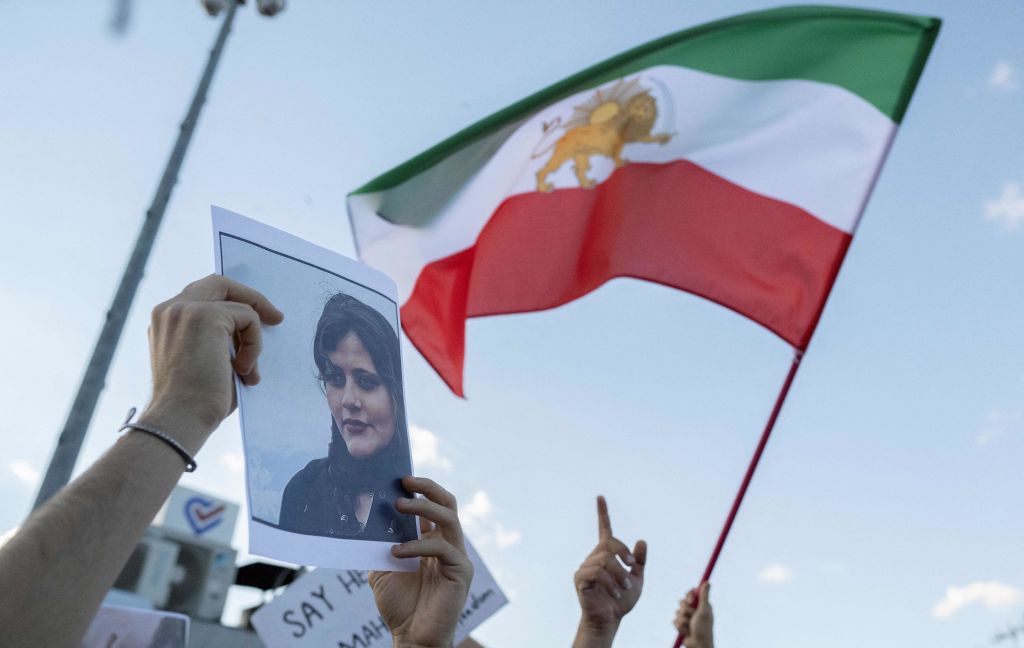France took some flak from Britain earlier this year for its perceived reluctance to rally to Ukraine after Russia’s invasion. They were accused of ‘appalling cowardice’ in one respectable newspaper and the Defence Secretary, Ben Wallace, suggested that there was a ‘whiff of Munich’ about France’s approach to Vladimir Putin.
Britain has from the outset been a staunch and commendable ally of Ukraine, a position that Liz Truss has promised to maintain as Boris Johnson’s successor. It’s not just the occupant of 10 Downing Street who has been a robust supporter: celebrities, sports stars and just about every walk of life has also got behind the blue and yellow flag.
Unfortunately this solidarity doesn’t extend to Iran. Last week an Iranian exile in London, Anoosheh Ashoori, who was released from a Tehran prison in April, said he was ‘dumbfounded’ by the British response. ‘We have a woman as Prime Minister now who is being silent and is witnessing the murder of all these women,’ said Ashoori. ‘Whereas if it’s Ukraine, if it is other places…I think they should be the same with people of Iran because women have been deprived for all these years.’
In Britain there have been no tears for the women of Iran, there is only silence
Ashoori was released from prison with British-Iranian national Nazanin Zaghari-Ratcliffe, who spent six years in jail after being accused of espionage, a charge she has always denied.
Last week Zaghari-Ratcliffe filmed herself cutting her hair in solidarity with the protestors in Iran, who continue to demonstrate against the compulsory wearing of the headscarf. It is a gesture that has come to symbolise the struggle being waged by the young women of Iran. ‘For my mother, for my daughter, for the fear of solitary confinement, for the women of my country, for freedom,’ said Zaghari-Ratcliffe in a video clip she released.
Other women across the West are being inspired to also cut their hair, among them several well-known French actresses, including Juliette Binoche and Marion Cotillard. More than 1,000 people in the French film industry have signed a petition ‘supporting the revolt by women in Iran’.
Swedish MEP Abir Al-Sahlani staged her protest during a speech to the EU Assembly in Strasbourg on Wednesday, snipping her ponytail as she contrasted the courage of the protestors in Iran – dozens of whom have been killed and hundreds arrested – with the cowardice of the West. ‘Our leaders across the globe and in the democratic free world are not meeting that courage,’ declared the Iraqi-born Al-Sahlani. ‘They are mumbling, giving out press releases, and I’m utterly tired of these old, tired politicians who don’t want to take a stand for what is righteous.’
The French parliament did at least acknowledge what is happening in Iran when, on their return this week to the National Assembly after the summer break, they stood in a minute’s silence for those who have lost their lives.
A handful also attended a rally in Paris at the weekend, including Sandrine Rousseau, a militant feminist and Green MP. To her surprise she was jeered and heckled by many of her fellow demonstrators. They hadn’t forgotten her defence of the headscarf during a TV debate last year with Fatiha Agag-Boudjahlat. Herself a feminist, Agag-Boudjahlat described the headscarf as ‘retrograde and sexist’, but Rousseau said it was a symbol of freedom, demonstrating that women can dress how they want. ‘It makes me despair that women’s bodies and the way they dress their bodies are still a subject,’ said Rousseau.
It should come as no surprise that France alone among western nations is demonstrating solidarity with the young women of Iran. This is a battle they have been fighting for decades, albeit on a much smaller scale, against extremists whose ambition is to ‘re-Islamise’ the Muslim youth of France. They saw through the sophistry of ‘Islamophobia’ years ago, recognising it as a strategy to silence any criticism of Islam.
That the extremists in France have been largely unsuccessful is because of women such as Agag-Boudjahlat and Zineb El Rhazoui, a former writer for Charlie Hebdo, who requires round-the-clock police protection. In an interview earlier this year, she declared herself in favour of a ban on the headscarf in public spaces, saying ‘the headscarf and the Republic are not compatible’.
Her interviewer was Sonia Mabrouk, one of France’s most respected political journalists and a long-standing critic of the headscarf. On Tuesday, Mabrouk wept live on air as she played an Iranian protest song, ‘Bella Ciao’, released on social media after the death last month of Mahsa Amini at the hands of Tehran’s Morality Police.
In Britain there have been no tears for the women of Iran, no wielding of scissors and no bold declarations from the Defence Secretary. There is only silence. That ‘whiff’ of appeasement no longer emanates from France.







Comments